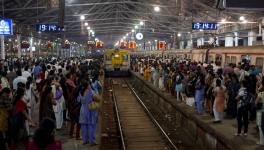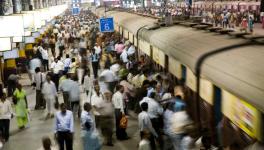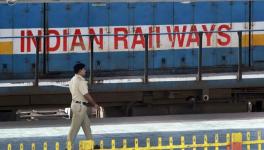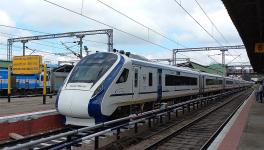Slowdown and Now a Lockdown: Railways Stares at Heavy Losses
New Delhi, April 2: A lack of buoyancy in the market coupled with the COVID-19 pandemic has had an adverse effect on the Indian Railways as well. Traffic receipts for the fiscal 2019-20 are way behind the last fiscal, reflecting the enormity of the economic slump.
The slowdown has not just reduced freight operations, but also left a considerable gap in the passenger segment. Its total collection stood at Rs 1.75 lakh crore for this year as opposed to Rs 1.81 lakh crore last year.
Passenger collections exceeded the Rs 52,000 crore mark set last year despite low demand and heavy refunds in March due to the cancellation of train operations in the wake of the coronavirus scare. The state-run transporter had to refund about Rs 750 crore in March owing to ticket cancellations after the suspension of passenger train operations due to the lockdown.
Though the final tally is still being put together, those in the know told NewsClick that the Railways earned about Rs 53,000 crore in the passenger segment against a target of Rs 56,000 crore. The extent of a rapidly unfurling economic crisis can be gauged from the fact that the Railways’ freight revenue, its mainstay, is far behind the budgeted target and its collection from last year.
The public transporter could mop up only about Rs 1.24 lakh crore by the end of March as against Rs 1.29 lakh crore last year and a budget estimate of Rs 1.43 lakh crore. Despite the recession, we could transport 1,209 million tonnes (MT) goods, said a senior Railway Ministry official.
The official blamed the market for sluggish traffic receipts, adding that the demand for coal, cement, iron ore, steel and fertiliser was lesser, even during peak season. “Still, we were expecting to load 1123 MT of goods as some incentives were announced to boost freight operation," they said.
As per provisional estimates, the public behemoth carried 1208 MT in load for the fiscal 2019-20. As of now, freight operations are on while the passenger service has been totally suspended due to the pandemic.
As a result, losses from the passenger revenue stream come to about Rs 150 crore per day, while the loss is about Rs 200 crore from the freight segment as demand for all bulk items is on a downturn. Since the power sector is not looking for much coal and stagnation in the real-estate sector has resulted in a drop in demand for cement. Subsequently, the loading of these goods has witnessed a fall. Consumption of petrol and diesel is also low due to restriction on movement and as a result, the movement of petroleum goods is at a bare minimum.
However, the Railways is functional with loco pilots, guards, station masters, control rooms and signalling sections are active to ensure supply of essential items like milk, sugar, salt, food grain, vegetables and fruits. At the moment, the Railways has kept its freight corridors fully functional for essential commodities and vital goods for energy and infrastructure despite challenges due to the COVID-19 lockdown, said the official.
At the same time, the Indian Railways is ready to provide 3.2 lakh isolation beds in 20,000 coaches for suspected coronavirus patients across the country. Work on 5000 coaches is on and the work order for the rest is likely to be undertaken shortly. Railway workshops are also
making sanitisers and face masks. The public transporter is also distributing free meals at several stations including New Delhi, Nizamuddin, Sarai Rohila, Mumbai, Patna, Ranchi, Tatanagar, Bengaluru and many others across the country.
Railway officials were facing issues in loading and unloading operations at various terminals which are being effectively resolved with the Ministry of Home affairs in touch with state governments to sort out any such operational issue.
Get the latest reports & analysis with people's perspective on Protests, movements & deep analytical videos, discussions of the current affairs in your Telegram app. Subscribe to NewsClick's Telegram channel & get Real-Time updates on stories, as they get published on our website.
























